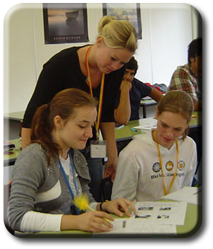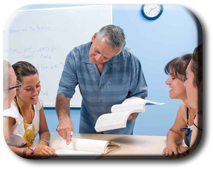-

teach our students to express their own thoughts and feelings accurately and clearly orally and in writing instead of merely rote learning and parroting memorized phrases and clichés out of context, this is why you are offered to write essays at home, paraphrase texts, instead of simply doing workbook exercises with keys
-
let you practise the language in situations in which you are likely to find yourself in
-
know that one cannot read aloud with the right intonations while simultaneously understanding what is being read
-
help you understand and use language patterns without formulating rules and memorizing abstract linguistic terms
-
save your time by determining what you don't need to study: if one wants to become a cook, cramming books on chemistry is totally unnecessary
|
-
know that the students' personal impressions of their progress or lack of it are very deceptive, this is why they benefit from receiving detailed progress reports
-
help you master effective self-study skills so that your reliance on the tutors would gradually diminish
-
although we do employ Tamil assistants at the Elementary and sometimes Pre-Intermediate level classes, we always seek to minimize the use of the Indian languages in the classroom in a way that would not slow down your advancement
-
help you learn faster by enhancing your awareness of mental processes and the process of verbalisation in particular
-
teach you how to apply attention-control techniques in language acquisition to enable you to enjoy the study process
-
know that there is no rigid sequence in learning new words, collocations and expressions, that would be the only "right" and universal path for all students
-
are aware of the fact that 90% of the study of grammar and structures is not a linear process, unlike the study of mathematics, although each unit of grammar and each pattern is related to several other units of grammar and patterns (in quality coursebooks these connections are taken into account)
|
|

-
are familiar with structure of the language well enough not only to be able to teach by a coursebook and to follow rigidly the lesson plans, but also to digress from it while following the students' line of interest without neglecting lexical and grammatical connections
-
know the difference between slow and fast memory, as well as reinforcement periodicity
-
help you learn how to use the Internet to practise your language skills with native speakers of English
-
know that it is important for the student to receive the tutor's answer to his question before the question is forgotten, this is why we offer optional after-class support 
-
don't always give our students direct answers to their questions (which is what unprofessional teachers do): we provide them with clues and hints and help them find the answers
-
distinguish between slips and errors
-
not only correct your mistakes at the right times but also to explain why you made them, how your speech will be perceived by native speakers and also who (including speakers) and when commits such errors
-
understand that learning a foreign language is initially to a large extent a comparative study of the languages already known to you
|
-
realise that to learn authentic English - rather than Tanglish - you should learn how to build phrases and sentences in your native language in the English way, which may affect the rigid automatic production of native language
-
know what materials and methods are more suitable for people with a mathematical mind
-
will teach you how to use Hornby's structures and patterns effectively
-
occasionally use some elements of the Callan method
-
believe that if a student does not have any questions, he is asleep
-
have mastered the communicative approach to effectively use role-playing games, grammar games, discussions and other communicative activities to guide the students to talk to each other in English in familiar and unfamiliar situations
-
will teach you when and how to use different types of speech, balancing fluency and accuracy according to the situation
-
will guide you in your practice of mixed speech
-
help you clarify your objectives and goals in the learning process to determine of what is central and what is optional
|
|
|




